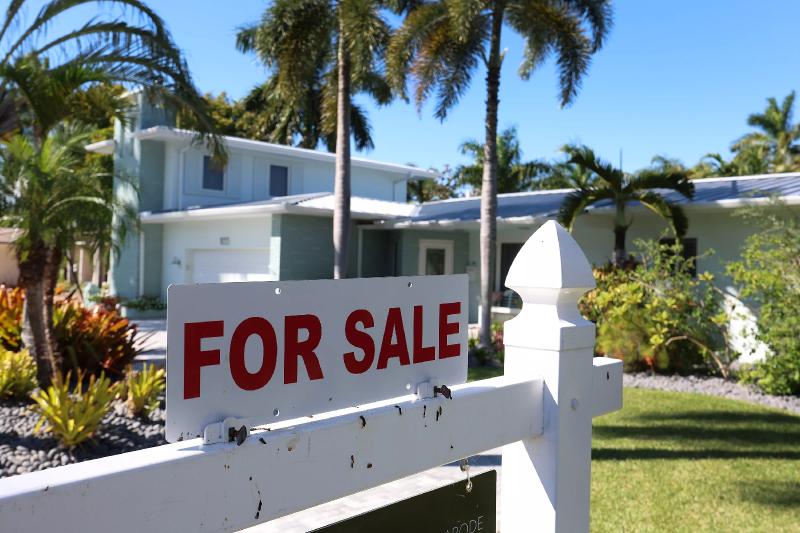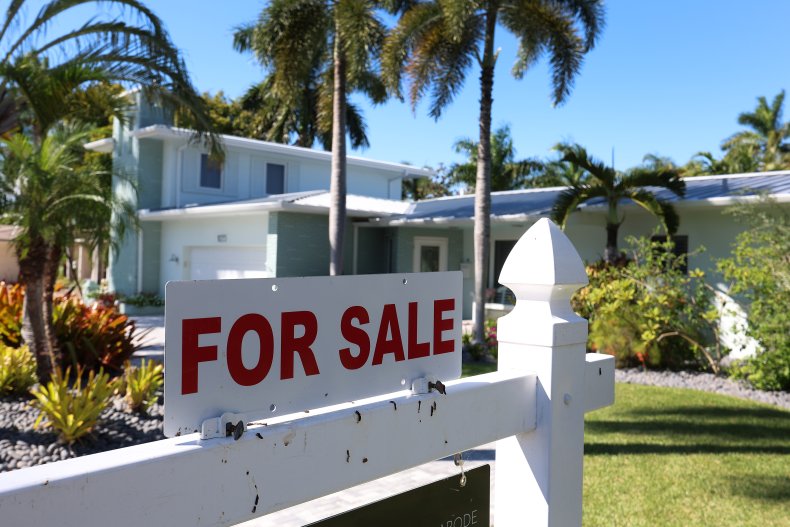Biden Raises Costs for Homebuyers With Good Credit to Help Risky Borrowers
Category: News & Politics
Via: independent-liberal • 2 years ago • 4 commentsBy: Katherine Fung (Newsweek)



U.S.Affordable housingHousingJoe BidenLoans
Homebuyers with good credit scores will soon be facing higher mortgage fees as the Biden administration seeks to close the racial homeownership gap and get more first-time and low-income buyers through the door.
Starting in May, a new federal rule will upend the current structure of the Loan-Level Price Adjustment (LLPA) matrix. Homebuyers with a good credit score could see their monthly mortgage payment rise by over $60 a month, while riskier borrowers will get more favorable mortgage terms because their fees were reduced. It's a move the Federal Housing Finance Agency (FHFA) hopes will address housing affordability challenges in the U.S., but it's come under scrutiny for being unfair and potentially ineffective.
"In the short term, this may increase homeownership among the targeted group, but I'm afraid it could decrease homeownership among the middle class," Jerry Howard, CEO of the National Association of Home Builders, told Newsweek . "I'm not sure that we're not robbing Peter to pay Paul here."
Only about 25 percent of homebuyers with Federal Housing Administration loans are people of color, according to the White House. Black and Hispanic people, on average, have fewer savings to use as a down payment on a home and tend to have lower credit scores, according to David Stevens, former CEO of the Mortgage Bankers Association (MBA) and a former FHA commissioner during the Obama administration.
He told Newsweek that this can be attributed to factors like distrust in the banking system or being a first-generation American and that low credit scores can be a significant barrier to homeownership.
But in order for the FHFA to close the gap by bringing down LLPAs for those borrowers, the agency has to compensate for the reduction in borrowing fees by raising the LLPAs of borrowers with higher credit scores, who tend to be white. The average credit score in white communities was 727 in 2021, compared with 667 in Hispanic communities and 627 in Black communities, according to data analyzed by FinMasters, a personal finance blog.
 A home for sale awaits prospective buyers on October 27, 2022, in Hollywood, Florida. Starting in May, homebuyers with a good credit score could see their monthly mortgage payment rise while riskier borrowers will get more favorable mortgage terms because their fees were reduced, under a new federal rule.Joe Raedle/Getty Images
A home for sale awaits prospective buyers on October 27, 2022, in Hollywood, Florida. Starting in May, homebuyers with a good credit score could see their monthly mortgage payment rise while riskier borrowers will get more favorable mortgage terms because their fees were reduced, under a new federal rule.Joe Raedle/Getty Images
The effort to get more low-income Americans and Americans of color into homeownership is essentially being subsidized by borrowers who have better credit scores and who can contribute more to their down payment, Michael Borodinsky, a vice president at Caliber Home Loans, told Newsweek .
Borodinsky said while the plan was designed to help people who have historically faced obstacles to homeownership, it comes at the cost of negatively affecting buyers who worked hard to save enough money for a larger down payment and maintain a strong credit rating, especially since those buyers can "be of all demographics."
"This new rule unfairly penalizes Americans for having good credit and rewards those who accrue debt and don't pay their bills with cheaper loans," GOP Representative Michael Lawler of New York told Newsweek . "The way to expand access to housing isn't to reward bad credit. It's to bring down inflation, reduce property taxes, cut energy costs and invest in critical infrastructure."
Read more
- Stephen Breyer's defense of Clarence Thomas sparks outrage
- Fox News and Rupert Murdoch's legal headaches are just getting started
- GOP's 2024 presidential field looks historically diverse
- How many transgender athletes play women's sports?
Although the new rule, which takes effect May 1, is designed to assist low-income and minority borrowers by encouraging homeownership, industry experts have expressed concern that the plan fails to meet that goal.
Stevens said that while the generational limitations on homeownership among racial groups in the U.S. need to be addressed, FHFA Director Sandra Thompson's actions weren't enough to lower borrowing costs to the point it will "make a difference."
"We just went through to this completely convoluted discipline around risk-based pricing in the hopes of accomplishing something that isn't going to be accomplished," he said.
However, in a statement shared with Newsweek , the FHFA defended the changes. It called the recalibration of its pricing framework "minimal" and stressed that the agency's goal of making sure that the government-sponsored enterprises (GSEs) Fannie Mae and Freddie Mac "fulfill their role in any market condition."
But former National Economic Council Director Larry Kudlow said those GSEs have never "penalized" people who don't need government programs to help them own homes, calling the Biden administration's new rule a "middle-class tax hike."
"We learned the hard way [in 2008] that if you can't afford a home, just getting a subsidy one time to get a mortgage, you won't be able to carry it," Kudlow told Fox News on Thursday.
A spokesperson for the National Association of Realtors (NAR) told Newsweek that a GSE could still incentivize homeowners without punishing others and stressed that such a move is "especially needed" at a time when there is limited affordable housing "in all areas of the market."
"NAR urges the FHFA to eliminate the fee increase on strong credit borrowers," the spokesperson said.
Newsweek reached out to the White House for comment via email.
The timing of the upcoming LLPA changes is also "not ideal," given the spring buying season and low inventory, an MBA spokesperson told Newsweek . But the MBA is more concerned about another mortgage change: The addition of an LLPA for loans with a debt-to-income (DTI) ratio greater than 40 percent, which Borodinsky stressed is often a "moving target."
The DTI is calculated by taking a person's monthly debts, including minimum payments on credit cards and loans, and dividing it by that individual's income. The result is used to assess a person's ability to make the necessary monthly payments on a loan.
In a March 15 statement, MBA President and CEO Bob Broeksmit warned that because the DTI often fluctuates throughout the mortgage application and underwriting process, the new fees will further vary those estimates, thus "increas[ing] compliance costs and confus[ing] borrowers."
"[It] makes for a 'no win situation,'" Borodinsky said. "Especially because the borrower will feel that they were taken advantage of by the lender due to these changed circumstances."
After the MBA asked the FHFA to remove the DTI adjustment, the agency delayed the DTI ratio-based fee to August 1. But the MBA expressed disappointment that the FHFA is not considering alternatives to the new fees, which "simply are not workable for lenders and borrowers alike."
Stevens agrees, saying, "This would just make things really difficult for the lending community and for potential homebuyers," Stevens agreed. He added that he's "hopeful" Thompson will gut the adjustment before it goes into effect during the summer.


Strange times.
In typical progressive fashion Biden wants to take from the responsible and successful and give it to the lazy lady abouts and losers. What does he think is going to happen when all those unqualified people get loans and stop paying their bill (they didn't get bad credit by paying their debts). And what do you think will happen to home prices when those with good credit stop buying houses because they don't want to pay higher interest rates?
Biden's all into Socialism, whether it's student loans or home/mortgage loans.
*Moderate* Democrat? Pffft.